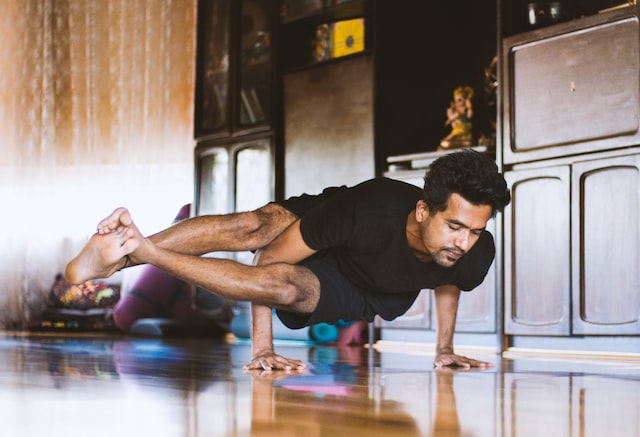Generally speaking, your ability to perform Bodyweight exercises depends on your height. So, whether you’re tall, short or average, it plays a significant role in your performance during bodyweight exercises. However, “are bodyweight exercises easier for smaller persons?” To answer this question, there are some in-depth studies that I’d like us to be abreast with. So that by doing so, you’ll realize that the answer to this question is not so far-fetched and is rather logical. Let’s move on
Why Does Height Affect Bodyweight Exercises?
Your height and weight are the primary factors that determine your strength-to-weight ratio, which in turn is heavily influenced by your ability to do workouts using only your own body weight.
The human experience and journey of calisthenics are so drastically different when it comes to shorter people vs taller people. This is true from the most fundamental exercises, such as pushups and pullups, to the most advanced exercises, such as front levers, planches, iron crosses, and so on.
Individuals with a smaller height may get front levers without ever having trained for them, whilst those of longer stature may practice for it for years with very nothing to show for their efforts.
There are weight classes in many sports because it would be unfair to cope without them. Being tall gives you an advantage in your absolute strength, which is why there are weight classes.
However, when compared to those of shorter stature, your relative strength is at a disadvantage. Therefore, the taller individual will have greater absolute strength but less relative strength than the shorter person.
Compare and contrast an ant with an elephant. An ant can carry many times its own weight. An elephant cannot. The elephant is much stronger, but the ant is considerably more powerful overall.
When a person grows taller or heavier, performing bodyweight exercises becomes more difficult because more strength is required to complete the same activity as compared to when the same exercise is performed by someone smaller or lighter.
Are Bodyweight Exercises Easier For Smaller Persons?
Absolutely yes! In most cases, a shorter individual will have an easier time lifting weights than a taller one will. In essence, shorter people have a mechanical advantage because they have a shorter distance to travel to move a weight.
This allows them to move the weight more quickly. Additionally, having shorter limbs, which again results in a reduced range of motion requirement, is a characteristic of people who are shorter in stature.
What’s The Short Person’s Advantage Over Taller Ones?
Having said that, it is generally true that if you are shorter it will be easier for you to lift weights. The primary explanation for this phenomenon is that people of smaller height enjoy a mechanical advantage over taller people.
Simply put, the range of motion is reduced, which indicates that a shorter person has a shorter distance to travel as a result. In addition, coming back around to the topic of limb length once more, those who are shorter will often have shorter arms and legs. This also explains why those with shorter legs have an easier time squatting than those with longer legs.
Similarly, bench pressing can be an incredibly challenging exercise for people who have long arms. Another factor that should be taken into account is that the center of gravity of a shorter individual will be located closer to the ground.
When it comes to core strength, this is a very helpful trait to have. When you also take into account the fact that the majority of workouts originate from the core, this provides shorter people with even another advantage when it comes to many of the traditional lifts.
What’s The Tall Person’s Advantage Over Shorter Ones?
It’s a two-way benefit therefore, no person can have all the advantages. Since there are advantages to being short, tall people also have advantages over their shorter counterparts when it comes to bodyweight exercises.
The most simplistic way to look at this is to consider the fact that a taller person has more room in their physique for the development of muscle. Therefore, if a tall person and a short person both reached their full potential in terms of muscle and strength, the taller person would unquestionably be stronger and have more muscle than the shorter person.
When it comes to lifting weights, a person of average height or shorter height simply cannot hope to compete with someone of average height or taller height.
In addition, referring back to what I have said earlier regarding having a limited range of motion, can this really be considered an advantage? Come to think of it, a taller person needs to put in more effort to execute the majority of lifts, which implies that they get more bang for their buck from the training that they do. The act of lifting weights is essentially an application of force in opposition to resistance.
Therefore, if you need to exert a higher force across a further distance, this indicates that you will need to put in more effort. As an illustration, let us have a look at how a tall person should perform the barbell back squat. Imagine for a moment that a tall person and a short person both have the exact same amount of weight on the bar.
Someone taller will have to go a longer distance, which also indicates that they will be under tension for a longer period. It is possible that this will not make much of a difference for a single rep, but picture yourself doing this for 10 reps, and then see yourself executing 4 sets of 10 reps.
Because taller people have to put in significantly more effort and spend a bigger proportion of their waking hours in a state of stress, it follows that they have a better capacity for developing both muscle and strength.
In practice, it might take a short person 35 seconds to perform 10 reps of squats, whereas it might take a tall person 36 seconds to do the same thing. This difference is due to the distance that needs to be travelled.
When compared to a single set, it is obvious that this does not make a significant impact; but, when taken into account throughout an entire exercise, a week, a month, or even a year, this can have a significant impact!







